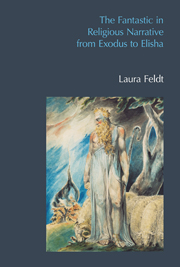Book contents
- Frontmatter
- Contents
- Acknowledgements
- Introduction: More Things—Marvels, Monsters, Miracles
- 1 Fields of Fantasy
- 2 Fantasy and Religious Narrative: Theory and Strategy
- 3 Marvels, Magic and Mystery: Reading the Fantastic in the Exodus Narrative
- 4 Between Wonder and Doubt: Fantastic Strategies, Their Effects and Status in the Exodus Narrative
- 5 Exodus as Mnemo-Fantasy: The Functions of the Fantastic in the Exodus Narrative
- 6 From Ethnogenesis to Everyday Life: Contextualizing the Fantastic in Hebrew Bible Narrative
- 7 Es spukt…—The Fantastic in Religious Narrative
- Bibliography
- Index of Biblical References
- Index of Authors
3 - Marvels, Magic and Mystery: Reading the Fantastic in the Exodus Narrative
- Frontmatter
- Contents
- Acknowledgements
- Introduction: More Things—Marvels, Monsters, Miracles
- 1 Fields of Fantasy
- 2 Fantasy and Religious Narrative: Theory and Strategy
- 3 Marvels, Magic and Mystery: Reading the Fantastic in the Exodus Narrative
- 4 Between Wonder and Doubt: Fantastic Strategies, Their Effects and Status in the Exodus Narrative
- 5 Exodus as Mnemo-Fantasy: The Functions of the Fantastic in the Exodus Narrative
- 6 From Ethnogenesis to Everyday Life: Contextualizing the Fantastic in Hebrew Bible Narrative
- 7 Es spukt…—The Fantastic in Religious Narrative
- Bibliography
- Index of Biblical References
- Index of Authors
Summary
The chapter offers a selective, sequential reading of the fantastic in the Exodus narrative (Exod. 1–18), aiming to show the fruitfulness of the fantasy-theoretical perspective and to contend the elicitation of a fantastic effect in this religious narrative. My focus is here on close readings of how specific literary-fantastic strategies function in their literary contexts, on how the fantastic effect is elicited, which phantasms are verbalized, and how they relate to alterity and identity constructions in the narrative. In this way, I hope to bring a new perspective to the understanding of its fantastic elements. The second and third parts of the analysis of the fantastic in the Exodus narrative follow in chapters 4 and 5.
Phantasmagenesis–Ethnogenesis: Analyses
The fantastic is an integral, and prominent, part of the narrative of Israel's exodus from Egypt. Both its prominence and its ambiguity are purposeful, as I document in the following analyses. I also show the importance of text-internal reflection on the nature, meaning and veracity of the phantasms, and how specific literary traits stimulate curiosity and a search for meaning, detectivism, in the intended recipient. The great number of fantastic elements in Exodus 1–18—the fantastic excess—should not be reduced or deemed inauthentic, for the excess is in itself important. It is exactly what makes this text stand out in the context of the Hebrew Bible, testifying that it is concerned about the construction of and reflection on alterity.
- Type
- Chapter
- Information
- The Fantastic in Religious Narrative from Exodus to Elisha , pp. 77 - 132Publisher: Acumen PublishingPrint publication year: 2012

